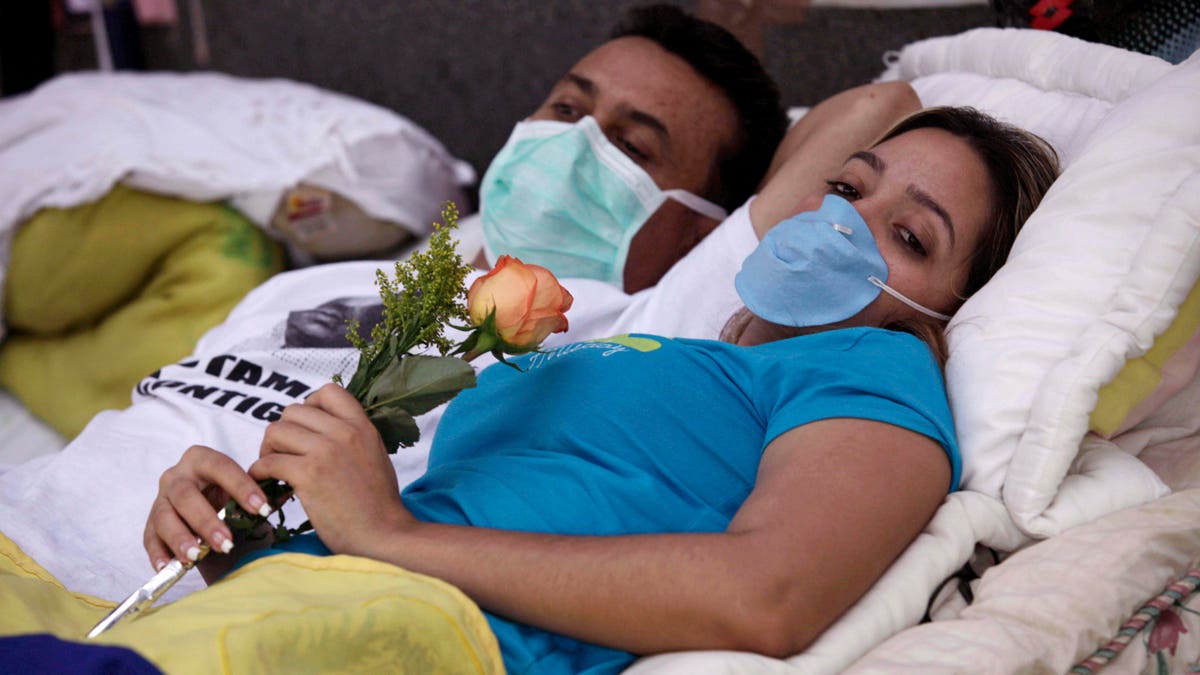
Los estudiantes Isli Lugo, al frente, que sostiene una flor, y German Cortez, aparecen en Caracas, Venezuela, el martes 15 de febrero de 2011, durante una huelga de hambre que desde el 31 de enero llevan adelante unos 12 estudiantes que buscan que la Organización de los Estados Americanos, OEA, investigue denuncias de violaciones de los derechos humanos de parte del gobierno del presidente venezolano Hugo Chávez. (AP Photo/Ariana Cubillos)
What started off as a small hunger strike of Venezuelan students, is now growing as dozens of people have joined the protest demanding that the government let the Organization of American States investigate alleged human rights abuses under President Hugo Chávez.
The activists vow to press on with the protest until OAS Secretary-General José Miguel Insulza or the OAS's Inter-American Human Rights Commission are authorized to visit Venezuela. Protesters say Chávez uses judges and prosecutors to persecute his political adversaries.
According to El Nacional, the students have specifically referenced and asked for the release of 27 people they say are political prisoners.
Chávez denies his government persecutes its opponents.
Student activist Julio César Rivas said Friday that 65 people are participating in the hunger strike in Caracas that began on Jan. 31.
Although the students say they are subsisting on water and saline solution, according to El Nacional, Cesar Rivas fainted 10 days after the beginning of the hunger strike. He was attended to by a medic who diagnosed him with the beginning stages of low blood pressure that could present problems for his kidneys.
The Venezuelan students met with the Interior and Justice Minister Tareck El Aissami and other representatives of the national government on Thursday in Caracas.
"It was a very respectful and frank dialogue about several issues and I let them know that more than ever before in Venezuela human rights are respected, " said Aissami, according to El Nacional.
The minister also said Friday that they are evaluating the requests of those on the hunger strike with the goal of increasing political debate.
He also said the hunger strike is of "supreme interest to the government" and reiterated that the government's main concern is the health of those participating in the strike.
The United States has formally supported the students in Venezuela.
"We believe that independent civil society, including participation by young people, has a critical role to play in a democracy," the U.S. State Department said in a statement.
"We are concerned about the health and well-being of the students who are risking their lives for their belief in democratic governance and individual liberties," the statement said. "We urge the Venezuelan Government to agree to a visit by the OAS as a means to promote dialogue and understanding."
The Venezuelan government reacted in a press conference Friday criticizing the United States of trying to meddle in their affairs.
"It looks like they (U.S.) want to start a virtual Egypt," said the foreign minister, Nicolás Maduro, according to El Nacional. "That's exactly what we need, the United States government meddling in Venezuelan affairs, in things that only concern Venezuelans."
Maduro added that the government will not take any action that is deemed unconstitutional.
The students reiterated that they are not asking for anything outside of the rule of law or the constitution, according to El Nacional. The students said "we are just asking for the respect of human rights and human dignity," the newspaper quoted them saying.
"If there is no positive response from the government, more people will join the strike," Julio Cesar Rivas said to the Associated Press.
The Venezuelan hunger strike draws similarities to the current protests held by University of Puerto Rico students who for months have protested the university's imposition of an $800 special fee tacked on to tuition and a heavy police presence.
Both movements are grassroot efforts led by youth, both are drawing national and international support via social media, and both are movements against the established power.
On Friday, the hash tags #OperacionLibertad, and #HuelgaDeHambre saw feverish activity as tweets supporting the Venezuelan hunger strike poured into those conversations.
"#OperacionLibertad is for all Venezuelans!," Milagros González tweeted in Spanish. "They aren't in a hunger strike for nothing! They are using their bodies as a tribute to the survival of Venezuela.#OperacionLibertad," Rafael Marín wrote.
This Venezuelan social media awakening comes months after an amendment to the Social Responsibility Media law that allows the government to restrict Internet messages and access. The measure stated that the use of Facebook and Twitter to spread "media manipulation" would be prohibited.
"Mr. Chavez you should feel envy at the difference between Venezuelan youth and the thugs you talk about." the anonymous @mtenator tweeted.
Follow us on twitter.com/foxnewslatino
Like us at facebook.com/foxnewslatino
